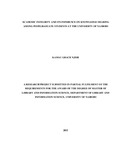| dc.description.abstract | The aim of the study was to investigate the effects of knowledge sharing on academic integrity among postgraduate students at the University of Nairobi. The study was guided by the following objectives: to find out factors affecting academic integrity; to explore effects of academic integrity; to examine institutional policies that address academic integrity; to identify challenges encountered in enhancing academic integrity and to suggest possible strategies to promote academic integrity. The study used a descriptive research design and employed triangulation approach. Purposive sampling technique was used to select Faculty administrators as respondents while stratified random sampling was used to select respondents that included lecturers and postgraduate students from the College of Architecture and Engineering, College of Education and External Studies and the College of Humanities and Social Sciences from the University of Nairobi. The sample size for the study comprised 5 Faculty administrators, 12 lecturers and 82 postgraduate students from the above mentioned colleges. Data for the research was collected by use questionnaires, interview guide and content analysis. Quantitative data was analyzed using descriptive statistics while qualitative data was analyzed using themes by quoting respondents. Statistical Packages for Social Sciences and Microsoft Excel software were used in data analysis and information was presented using pie charts, tables and graphs. A pilot study was conducted at Moi University- Nairobi campus to ensure quality research instruments before embarking on the main study. The key findings of the study indicated that examination cheating and plagiarism were the major forms of academic malpractices. In addition, poor referencing skills, laziness, poor time management and intentions to get better marks were the key factors affecting academic integrity and thus affecting knowledge sharing. Recommendations to the study included use of Closed-Circuit Television cameras in large examination rooms, sensitization campaigns about academic integrity, incorporation of information literacy sessions in the course syllabus and use of anti-plagiarism software to test students‟ class assignments. The study would assist Faculty administrators and lecturers to understand the factors affecting academic integrity and the implications of academic integrity on knowledge sharing. In addition, students would understand what constitutes academic integrity and consequences of not adhering to integrity measures in academic work. | en_US |

